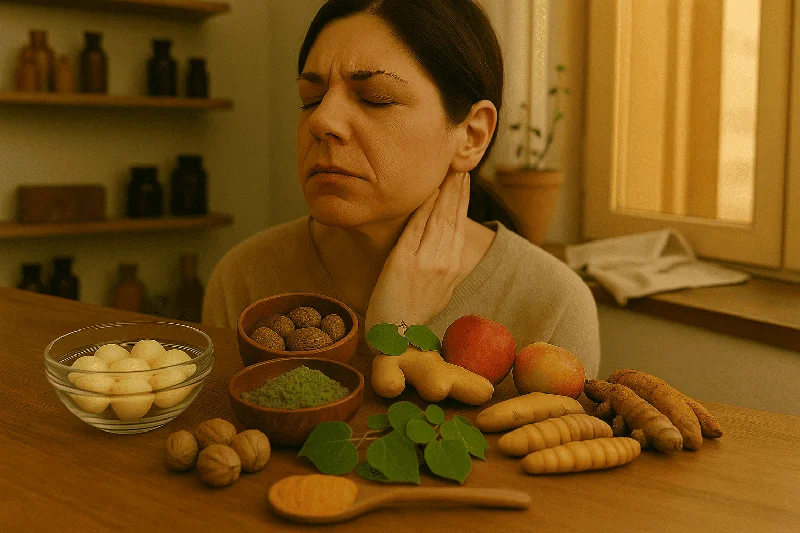Ask Ayurvedic doctor a question and get a consultation online on the problem of your concern in a free or paid mode. More than 2,000 experienced doctors work and wait for your questions on our site and help users to solve their health problems every day.
Food Allergy Treatment in Ayurveda: Natural Relief Through Holistic Healing

Imagine finding a natural solution that not only alleviates the discomfort of food allergies but also addresses the root cause of these reactions by restoring balance to your body. Ayurveda, a 5,000-year-old holistic system of medicine, offers a unique perspective on managing food allergies. By focusing on restoring harmony among the body’s energies and detoxifying accumulated toxins, Ayurvedic treatment aims to reduce sensitivity and promote long-term wellness. In this comprehensive guide, we explore food allergy treatment in Ayurveda by integrating traditional wisdom with modern scientific insights, practical usage guidelines, and lifestyle recommendations.
Understanding Ayurveda and Its Core Principles
Ayurveda, meaning “the science of life,” is built on the principle that optimal health arises from the balance between body, mind, and spirit. Central to Ayurvedic philosophy are several key concepts:
- Doshas: The three fundamental energies—Vata (movement), Pitta (transformation), and Kapha (structure)—govern our physiological and psychological functions. Imbalances in these doshas can lead to various health issues, including food allergies.
- Agni: The digestive fire responsible for metabolizing food and nutrients. A strong Agni ensures proper digestion and prevents the formation of toxins.
- Ama: Toxins or undigested residues that accumulate when Agni is weak. Ama is considered a primary cause of inflammation and hypersensitivity in the body.
- Ojas: The essence of vitality and immunity. Ojas is what supports our resistance to disease and allergies; when depleted, the body becomes more susceptible to allergic reactions.
- Rasayana: Rejuvenation therapies aimed at enhancing longevity and immunity. Rasayana treatments help in rejuvenating the body, thus reducing sensitivity to allergens.
According to Ayurveda, food allergies are often a manifestation of imbalanced doshas, impaired digestion, and accumulated Ama. The treatment strategy, therefore, focuses on detoxification, strengthening Agni, and restoring Ojas to build a resilient immune system.
Don't wait or self medicate. Start chat with Doctor NOW
What Are Food Allergies? An Ayurvedic Perspective
Food allergies occur when the immune system reacts adversely to certain foods, resulting in symptoms such as itching, swelling, digestive issues, and in severe cases, anaphylaxis. From an Ayurvedic viewpoint, these allergic responses are primarily linked to:
- Agni Impairment: A weak digestive fire can lead to incomplete digestion, resulting in the formation of Ama, which triggers inflammatory responses.
- Dosha Imbalances: Often, an aggravated Pitta (associated with heat and inflammation) combined with an imbalanced Kapha (leading to congestion and heaviness) can create an environment where the body reacts adversely to certain foods.
- Low Ojas: A depleted immune reserve makes the body less capable of defending against allergens, making reactions more severe.
Ayurvedic practitioners diagnose food allergies by assessing individual dosha imbalances, digestive strength, and overall vitality, then prescribe personalized dietary and herbal interventions to restore balance.
Traditional Ayurvedic Remedies for Food Allergies
Ayurveda offers a multitude of natural remedies that work to alleviate the symptoms of food allergies while addressing their root causes. Some traditional approaches include:
-
Herbal Formulations:
- Triphala: A blend of three fruits, Triphala is renowned for its detoxifying and digestive-enhancing properties. It helps eliminate Ama and strengthens Agni.
- Turmeric: With its potent anti-inflammatory and antioxidant properties, turmeric is used to calm the immune system and reduce allergic inflammation.
- Guduchi (Tinospora cordifolia): Known for its immune-modulating effects, Guduchi supports the body’s defense mechanisms and helps restore Ojas.
-
Dietary Modifications:
- Balancing Foods: Emphasis is placed on consuming warm, easily digestible meals that are tailored to one’s dosha. For example, if Pitta is aggravated, cooling foods like cucumbers and leafy greens are recommended.
- Avoidance of Allergenic Foods: Identification and elimination of trigger foods are crucial. Ayurveda suggests a temporary elimination diet to cleanse the system.
-
Detoxification Therapies:
- Panchakarma: A series of cleansing therapies designed to remove toxins from the body. Procedures like Vamana (therapeutic emesis) and Virechana (therapeutic purgation) may be recommended based on the individual’s condition.
- Herbal Teas and Decoctions: Infusions made from herbs such as Tulsi (Holy Basil), Licorice, and Ginger can soothe the throat, reduce inflammation, and support digestion.
-
Lifestyle Practices:
- Mind-Body Techniques: Yoga and meditation help reduce stress—a known aggravator of allergic reactions—and support overall immune health.
- Regular Exercise: Gentle physical activities, like walking and yoga, promote circulation and help maintain a robust digestive system.
Modern Scientific Research and Insights
While Ayurveda’s approach to food allergy treatment is rooted in centuries of practice, modern research is beginning to validate many of its principles:
- Anti-Inflammatory Effects: Studies have shown that turmeric’s active compound, curcumin, can significantly reduce inflammatory markers. This supports its traditional use in managing allergic inflammation.
- Digestive Health: Research indicates that herbal formulations like Triphala enhance digestive efficiency, reduce gut inflammation, and help eliminate toxins, aligning with Ayurvedic theories on Agni and Ama.
- Immune Modulation: Investigations into Guduchi reveal its potential to modulate the immune response, making it a promising natural remedy for allergies.
- Antioxidant Properties: Many Ayurvedic herbs are rich in antioxidants, which protect cells from oxidative stress and contribute to overall health and resilience.
Though more comprehensive clinical trials are necessary to establish standardized dosing and long-term efficacy, current studies provide promising support for Ayurveda’s holistic approach to managing food allergies.
How Ayurvedic Food Allergy Treatment Works: Mechanisms Explored
Ayurvedic Mechanisms
From the Ayurvedic perspective, the treatment of food allergies involves several interrelated processes:
- Restoring Agni: Enhancing the digestive fire is key to proper digestion. A robust Agni prevents the formation of Ama, which is the root cause of many inflammatory conditions.
- Balancing Doshas: Customized dietary recommendations and herbal treatments help harmonize the aggravated doshas. For example, cooling and light foods are recommended to pacify Pitta, while warming spices may balance Kapha.
- Detoxification: Panchakarma and herbal detox remedies work to eliminate accumulated Ama, thereby reducing the triggers for allergic reactions.
- Replenishing Ojas: Rasayana therapies and immune-boosting herbs work to build Ojas, enhancing the body’s natural defense mechanisms against allergens.
Scientific Mechanisms
Modern research offers additional insights into how these treatments may work at the cellular level:
- Anti-Inflammatory Actions: Phytochemicals found in herbs such as turmeric and licorice inhibit pro-inflammatory cytokines, reducing the intensity of allergic reactions.
- Improved Digestion: By stimulating digestive enzymes and enhancing gut motility, formulations like Triphala ensure efficient digestion and toxin elimination.
- Immune Regulation: Adaptogenic herbs such as Guduchi help modulate immune responses, preventing an overactive reaction to harmless allergens.
- Antioxidant Protection: The high antioxidant content in many Ayurvedic herbs protects cells from oxidative stress, thereby reducing tissue damage and inflammation associated with allergic responses.
Practical Guidelines for Using Ayurvedic Remedies for Food Allergies
For those considering Ayurvedic treatment for food allergies, here are some practical guidelines to ensure safe and effective use:
Dosage and Administration
- Consult a Professional: It is essential to consult with a qualified Ayurvedic practitioner or healthcare provider to tailor a treatment plan that addresses your unique dosha and condition.
- Herbal Formulations: Follow the dosage instructions provided by your practitioner. Herbal formulations like Triphala, turmeric, and Guduchi should be used as directed, often in tablet or powder form.
- Dietary Adjustments: Engage in an elimination diet to identify trigger foods. Gradually reintroduce foods under the guidance of a nutritionist or Ayurvedic expert.
- Detox Therapies: If Panchakarma is recommended, ensure that it is performed under the supervision of a trained Ayurvedic therapist.
Key Considerations
- Hydration: Drinking warm water throughout the day supports digestion and helps flush out toxins.
- Stress Management: Incorporate relaxation techniques such as yoga, meditation, or deep breathing to reduce stress, which can exacerbate allergic responses.
- Monitor Symptoms: Keep a detailed diary of your symptoms and dietary intake. This will help you and your practitioner fine-tune your treatment plan.
- Consistency: The benefits of Ayurvedic treatment are often observed over a longer period. Consistent use of the recommended remedies and lifestyle practices is crucial for long-term relief.
Integrating Ayurvedic Food Allergy Treatment into a Modern Lifestyle
To maximize the benefits of Ayurvedic treatment for food allergies, consider incorporating these lifestyle strategies:
- Balanced Nutrition: Emphasize whole, fresh foods that are appropriate for your dosha. A diet rich in vegetables, fruits, whole grains, and lean proteins supports optimal digestion and immunity.
- Regular Exercise: Engage in moderate physical activities such as yoga, walking, or swimming to boost circulation and support overall health.
- Mindfulness Practices: Regular meditation and stress-reduction techniques can improve your immune response and reduce the severity of allergic reactions.
- Sleep Hygiene: Ensure you get 7–8 hours of quality sleep each night. Rest is crucial for cellular repair and overall well-being.
- Environmental Adjustments: Reduce exposure to known allergens in your living space by using air purifiers, keeping your home clean, and maintaining proper ventilation.
Potential Side Effects and Precautions
While Ayurvedic remedies for food allergies are generally considered safe when used appropriately, it is important to be aware of potential side effects and take necessary precautions:
- Herbal Sensitivities: Some individuals may have sensitivities or allergies to specific herbs. Always perform a patch test or consult your practitioner if you’re trying a new remedy.
- Digestive Upset: Overuse or incorrect dosage of herbal supplements may cause mild digestive discomfort. Start with lower doses and adjust as needed.
- Interactions with Medications: Ayurvedic herbs can interact with conventional medications. Inform your healthcare provider of any supplements or treatments you are using.
- Quality Assurance: Use high-quality, certified Ayurvedic products from reputable sources to avoid adulteration or contamination.
Frequently Asked Questions (FAQ)
Q: What causes food allergies according to Ayurveda?
A: In Ayurveda, food allergies are seen as a result of imbalances in the doshas, impaired Agni (digestive fire), and the accumulation of Ama (toxins). These imbalances weaken the body’s immunity (Ojas) and trigger hypersensitive reactions.
Q: Can Ayurvedic treatments be used alongside conventional allergy medications?
A: Yes, many people adopt an integrative approach. However, it is essential to consult with your healthcare provider to ensure compatibility and to avoid any potential interactions.
Q: How long does it take to see improvements with Ayurvedic food allergy treatment?
A: The time to notice relief varies by individual. Some may experience improvements in digestion and reduced symptoms within a few weeks, while comprehensive benefits may require consistent treatment over several months.
Q: What dietary changes are recommended for someone with food allergies?
A: Ayurveda recommends an elimination diet to identify trigger foods, followed by a balanced diet rich in fresh, whole foods tailored to your dosha. Avoid processed, spicy, or acidic foods that may aggravate inflammation.
Q: Who should avoid these remedies?
A: Individuals with known allergies to any of the herbal components, pregnant or nursing women, and those with chronic health conditions should consult a qualified Ayurvedic practitioner or healthcare provider before starting these treatments.
Conclusion
Food allergy treatment in Ayurveda offers a holistic approach that not only addresses the symptoms of allergic reactions but also works to balance the underlying imbalances responsible for these conditions. By restoring Agni, eliminating Ama, and replenishing Ojas, Ayurvedic remedies provide a natural, sustainable path to improved immunity and overall wellness. Whether you are seeking relief from acute allergic reactions or looking to fortify your immune system against future sensitivities, Ayurveda provides a time-tested strategy for managing food allergies naturally.
If you are considering integrating Ayurvedic treatments into your health regimen, consult with a qualified Ayurvedic practitioner to create a personalized plan tailored to your unique constitution and needs. Share this article with those interested in natural health solutions, subscribe to our newsletter for more insights on Ayurvedic practices, and leave your comments or questions below. Embrace the ancient wisdom of Ayurveda combined with modern scientific insights, and take a proactive step toward a healthier, more balanced life.
Disclaimer: The information provided in this article is for educational purposes only and should not be considered medical advice. Always seek the guidance of a qualified healthcare provider regarding any health or medical concerns.



